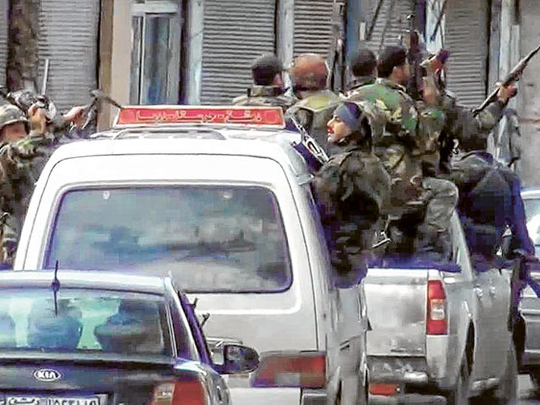
Damascus: As bullets were falling in Homs, in Damascus, it was a heavy rain that was hitting the rough cobble-stoned lanes of the Old City.
As artillery and tank rounds hit the homes of Homs, hail was falling heavily on the hills over the Beka'a Valley, and over the hills around Damascus.
In its thousands of years of history, this ancient city has seen many rulers. Roman ruins here are nearly as common as the coffee and shisha shops.
This ancient citadel of Damascus was too strong for the crusaders of Christendom, was ruled proudly by Ottomans, occupied by the French. Now it is the turn of the Al Assad dynasty.
From Beirut, the road to Damascus undergoes a dramatic conversion. It snakes over the snow-capped mountains that separate the Paris of the Mediterranean from the Levant. Then it drops dramatically through the Beka'a Valley, and up.
On the Lebanese side of the frontier at Masnaa, immigration exit procedures are a casual affair. An inspector chats of days spent in Montreal, reminiscing on the large Lebanese community there.
"Be careful," he warns. "The Syrians are not in a forgiving mood right now and they don't look too kindly on foreign journalists now."
I hold two passports of different nationalities and am trying to convince him to place a Lebanese exit stamp in the one that doesn't state my occupation. He's not buying it. According to the rules, the exit has to be placed on the one I entered Lebanon on. In Dubai, days earlier, visa papers were stalled. In Abu Dhabi, the Ambassador expelled, and the road to Damascus was going to be arduous.
Beyond Masnaa, Syrian officials sipped tea. Few were crossing into their land, and those that were were scrutinised carefully.
Fee paid to one bored official, I pass to a second officer for the all-important entry visa. He flips through my passport, looking for signs of Israeli entry in the "clean" the second passport with no exit visa and no occupation. "Where is the exit visa from Lebanon?" he asks.
A wonderful thing
Sheepishly, I produce the main tell-tale passport, waiting at any moment to be turned back to Beirut.
An Emirates airline rugby shirt is a wonderful thing, as good as a third passport.
"Ever been to Israel?" he asks.
"No," I reply.
"You travel a lot," he says, skimming through my pages, not yet coming to two UAE visa pages where my occupation as a journalist is clearly mentioned.
He sees my rugby shirt.
"Your work for Emirates?" he asks.
"I work in the Emirates," I answer, hoping that half a truth will bluff me through.
"In Dubai?" he asks.
"Yes," I answer, noticing that he has flicked past the red-flag page.
"Business or tourism?" he enquires.
"Yes," I answer, offering up another half truth.
He begins to write on a blank page. With two stamps, I have been admitted.
At two further checkpoints, soldiers and officers seek my passport. I am careful to have it already opened to the Syrian visa stamps, lest they notice those two journalist visa stamps.
Proclaiming the virtues
Overhead banners and roadside billboards proclaim the virtues of the Al Assad dynasty. Hafez and Bashar Al Assad are pictured everywhere, father and son, together, making Syria strong and proud.
Trucks carrying old Soviet-era tanks labour up the mountain road from Damascus, being deployed to quell unrest in this strong Syria.
In 11 months, more than 5,000 people have been killed in protests and bitter fighting as this country of the Al Assads tethers on the verge of civil war.
At government buildings and at strategic corners, or in places considered to be vulnerable to attack, soldiers cradle old Kalashnikovs.
The old models with the wooden stocks borne by most soldiers do not, somehow, feel as intimidating as the new models with folding metal stocks brandished by men in dark clothes and mostly leather jackets.
It is they who are doing the searching of cars and questioning of drivers and passengers, all ordered out, the threats from the Kalashnikovs with the folded metal stocks enough to persuade all for the need for cooperation.
In Damascus itself, posters of the President hang in most shopfronts, on street corners, anywhere where there is space to spare.
For a city where traffic is chaotic, there is an over-abundance of traffic police. At every major corner, at every busy section, they stand with white flat hats, black faux-leather jackets and whistles ever at the ready.
Few motorists or pedestrians, it seems, take notice of the whistles. This over-abundance of traffic officers is part of the strong Syria of the Al Assad dynasty.
‘Root them out'
"These people trying to destroy our country are terrorists, a guide called Bashir — no relation to the President — says.
"We support our president. These people are terrorists and Al Qaida. We have to root them out and destroy them before they destroy Syria."
"Since this trouble started, they have destroyed our economy," he says. "There are no tourists anymore."
(Maybe they can't get a visa, I muse.)
Here in the Old City, history is everywhere. Lanes are so narrow, even the smallest Korean and Japanese cars have scrapes down their sides and missing wing mirrors.
"Saint Paul visited the church down the street 2,000 years ago," Bashar the guide says.
In the narrow alleys and streets, sounds are muffled, smothered by the old bricks and mortar.
An old broom seller wanders through the streets, brooms of two sizes around his neck, shouting for takers. There are none on this street. So much for that old saying here in the strong Syria that a new brush sweeps clean.
"We have seen many rulers and empires come and go, but this Old City stays the same," Bashar says.












